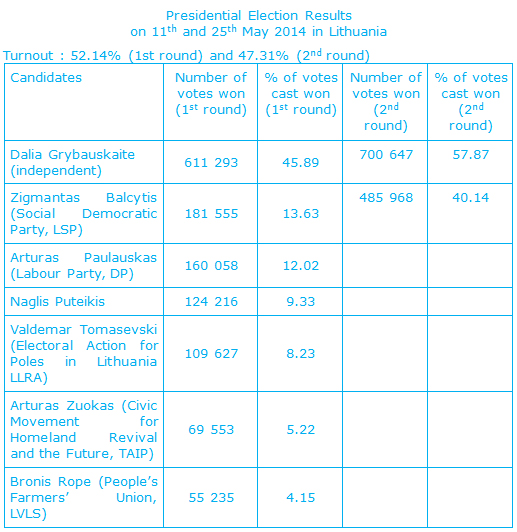Results
Elections in Europe
Corinne Deloy
-

Available versions :
EN

Corinne Deloy
Outgoing head of State Dalia Grybauskaite, who stood as an independent candidate but with the support of the centre-right opposition - Homeland Union-Conservatives (TS-LK), the Christian Party (KP) and the Liberal Movement (LRLS) was re-elected to the Presidency of the Republic of Lithuania in the second round of voting with 57.87% of the vote. She beat MEP and former Finance and Transport Minister Zigmantas Balcytis (Social Democratic Party, LSP), who was supported by the Labour Party (DP), who won 40.14% of the vote.
The election took place on the same day as the European elections. The Lithuanians elected the Social Democratic Party in the European vote and elected the liberal candidate in the presidential election.
Dalia Grybauskaite easily won the first round of voting on 11th May when she took 45.89% of the vote against 13,63% for Zigmantas Balcytis.
Turnout totalled 47.31%, ie -4.83 points in comparison with the first round on 11th May.
"I take the result of this election as a commitment vis-à-vis you all. No president of the Republic has ever been re-elected in Lithuania. It is an historic victory for you all," declared Dalia Grybauskaite. The outgoing President succeeded in convincing her fellow countrymen that she was the only one who was capable of being a real head of state. She chose the motto "I trust Lithuania" for her electoral campaign and was extremely critical about neighbouring Russia just as the Lithuanians were extremely worried about the events in Ukraine which they qualified as "Russian aggression". Dalia Grybauskaite even said that "she would take up arms herself to defend her country if national security required it."
Just a few days before the second round she criticised Finance Minister Rimantas Sadzius (LSP) who maintained that the state defence fund was "almost enough". The president indeed supports the government's project led by Algirdas Butkevicious (LSP) rallying the Social Democratic Party, the Labour Party (DP), For Order and Justice (TT) and Electoral Action for Poles in Lithuania (LLRA), to increase the defence budget for it to total 2%of the GDP in 2026. Vilnius spends 0.8% of this GDP annually on defence (the lowest percentage in the NATO countries). The rate is due to rise to 1% in 2016.
Zigmantas Balcytis was much more careful as he defended pragmatic foreign policy and dialogue with Moscow. "We must take up dialogue with Russia. Any kind of peace is preferable to a war," he stressed.
With the motto "One Lithuania at work, victorious and united," the candidate of the party in power focused his campaign on social and economic issues. "My main goal is to increase Lithuanian wages and to reduce the gap between the rich and the poor," he repeats, criticising the support given by Dalia Grybauskaite to Andrisu Kubilius's government (Homeland Union-Conservatives TS-LK 2008-2012) during the international economic crisis: reductions in civil servants' salaries and retirement pensions to support the State's finances and to peg the national currency, the litas, with the euro.
With just months to go before it joins the euro zone (the government would like this to take place in January 2015), the Lithuanians, who are concerned about the price rises that may occur with the change in currency, preferred to trust the former European Commissioner for the Budget (2004-2009).
Aged 58, Dalia Grybauskaite is a graduate in economy from the University of Zdanov Leningrad and has completed a thesis in economy at the Academy of Science of Moscow (1988). From 1983 to 1990 she was secretary at the Academy of Science and taught economy at the Communist College of Vilnius. The following year she became Secretary of Science at the Institute for the Economy and head of department at the Ministry for International Economic Relations and Foreign Affairs. In 1991, when Lithuania became independent again, she took charge of the negotiations between her country and Brussels before becoming ambassador at the EU and plenipotentiary Minister in the USA. She returned to Lithuania in 1999 to become Deputy Finance Minister for International Affairs, a post in which she was responsible for negotiating her country's entry into the EU. In 2001 Ms Grybauskaite was appointed Finance Minister in the government led by Social Democrat Algirdas Brazauskas (LSP), whom the head of State deems to be one of her mentors. In 2004 she became European Commissioner for the Budget and Financial Programming. She then implemented the reform of the Union's budget - work she was rewarded for as she received the title of European Commissioner of the Year in 2005. On 17th May 2009 she became the first woman to be elected to the Presidency of the Republic of Lithuania and the best elected head of State in the country's history. She won the election in the first round of voting with 69.10% of the vote. On 25th May 2014 she became the first head of State of Lithuania to be re-elected.
A keen sportswoman Dalia Grybauskaite has a black belt in judo and formerly was a member of the Lithuanian national junior basketball team.
On the same theme
To go further
Elections in Europe
Corinne Deloy
—
4 November 2025
Elections in Europe
Corinne Deloy
—
28 October 2025
Elections in Europe
Corinne Deloy
—
14 October 2025
Elections in Europe
Corinne Deloy
—
7 October 2025

The Letter
Schuman
European news of the week
Unique in its genre, with its 200,000 subscribers and its editions in 6 languages (French, English, German, Spanish, Polish and Ukrainian), it has brought to you, for 15 years, a summary of European news, more needed now than ever
Versions :




